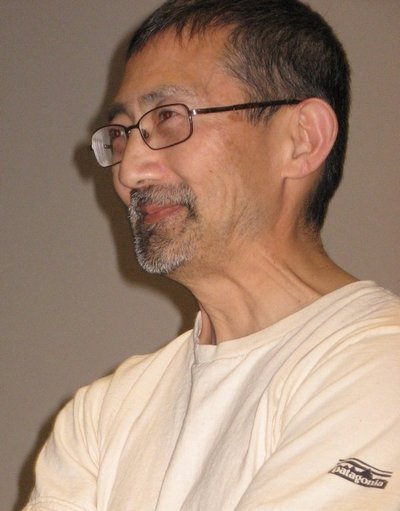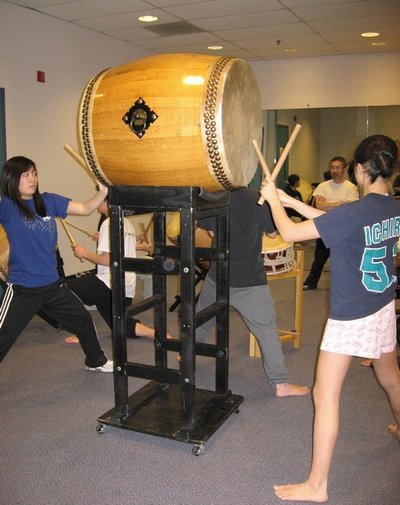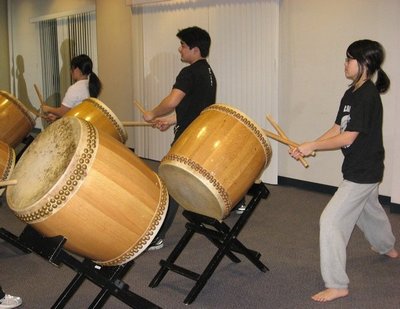April 24, 2008
Nurse passes Japanese drumming to next generation
It’s shortly after 6:30 p.m. on a Monday, and eight teenagers are ready to start taiko (pronounced ‘ty-ko’) practice. Stan Shikuma, a registered nurse who works at UW Medical Center and the Seattle Cancer Care Alliance, is instructor, coach and (when he’s not teaching) performer. Taiko is a mix of rhythm and movement carried out with drums of varying sizes and has origins embedded in Japanese culture and history.
The drum beats are so loud and booming in the practice room that everyone wears ear plugs. Beyond the music from the drums, the rhythmic movement of the teen performers is at times ballet-like and the sound hypnotic. Watching the teens perform, you get a sense of the old versus new culture, too. One young man sports a t-shirt that reads, “I can’t make it, I have taiko practice,” in a font akin to the popular “Got Milk” ads.
Shikuma coaches the teenagers on how they swing their arms, and the speed at which that should happen. To the untrained eye, it’s hard to see what he’s critiquing. But the performers, being teens, don’t hide it when they make a mistake. “You’re slower than everyone else,” says the coach to one young woman. “We already knew that,” quips a young man, a comment met by giggles and laughter.
Shikuma first became interested in the art form while attending college in the San Francisco Bay area. “I was active in Asian student groups at Stanford and Berkeley, so I would go to those and [taiko performers] would come to campus,” he said. “I always really enjoyed it, but I never really thought it was something that I could do because something that I could do because they were more like professional groups.”
Shikuma completed his undergraduate education at Stanford University and has a master’s degree in parasitology from the University of California, Berkeley. He also holds a nursing degree from the UW.
The “I’m not an artist” mindset changed when Shikuma moved to Seattle in 1981. He met someone during his first week here who had started a taiko group, and he was invited to a workshop the group was holding. “I [attended] and fell in love with it, so I’ve been doing it ever since,” the mild-mannered Shikuma said.
What drew him in? A number of things, he said. “Initially, there was just a joy of playing, the physicality of it, and movement,” Shikuma said. “It’s more than just rhythm; it’s also movement and spirit or energy that you put into the playing, so that kind of physicality. It’s also this feeling when you hit a big drum, you can really actually feel the vibrations going through your whole body.” Shikuma also said playing in a group and the related synthesis is equally enjoyable.
Taiko has its roots in Japanese culture and even in cultural activism. Shikuma said in the 1970s and early 1980s, he was involved in a lot of community activities related to redress, or a call for compensation for Japanese Americans who were forced during World War II to leave their homes, jobs and lives and were detained in Department of Justice camps in the West. Shikuma said he liked “the fact that taiko was community-based, and that a lot of the programs that we’d play for supported community organizations.” As a Japanese American, he said he found it exciting that through taiko, he could connect to his roots while also finding a new identity here in the United States.
As his experience and skill grew over the years, Shikuma said he found a new appreciation for the artistic possibilities of taiko. His work in taiko has helped him branch out into projects with local musician and opera composer Garrett Fisher and puppet theaters, among other projects. “When I first started taiko, I did not think that much about art or being an artist,” he said. “But now, I appreciate [that side] as well.”
There are eight performing taiko groups in Seattle. Shikuma performs primarily with Seattle Kokon Taiko (www.seattlekokontaiko.org). The youth group, Kaze Daiko, holds around a dozen performances each year (www.kazedaiko.com) in the area. One World Taiko (www.oneworldtaiko.com) is the resident professional group.



